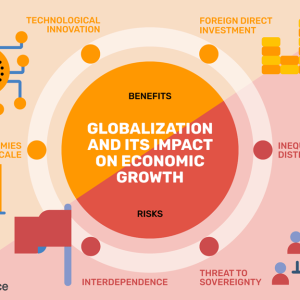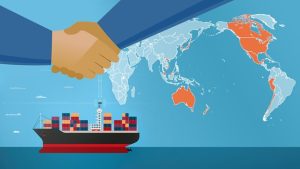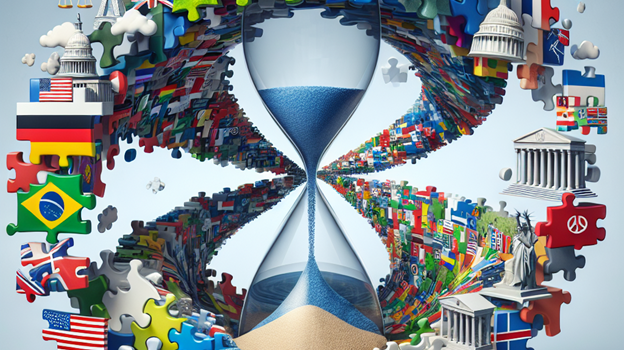
The landscape of global politics is undergoing a significant transformation, reshaped by various forces from economic shifts and globalization to the rise of social media and the pressing issue of climate change. These changing faces in global politics are not just altering the way nations interact but are also redefining the very essence of sovereignty, international collaboration, and the global political agenda.
Shift in Global Economic Power Balances
In recent years, the emergence of economies such as China, India, and Brazil has begun to reshape the global economic landscape, challenging the traditional dominance of Western powers. This shift is not merely economic; it carries profound political implications, altering the dynamics of international relations. As these emerging economies assert their economic and political influence, they bring a fresh perspective to global governance, demanding a more significant say in international institutions and the crafting of global policies. This redistribution of economic power is fundamentally changing the global perspective, introducing new players with distinct priorities and strategies for addressing global challenges.
Impact of Globalization on Sovereignty

Globalization, a force that has been gathering momentum over the past few decades, is reshaping the concept of sovereignty. It challenges the traditional notion of absolute national control over economic policies, as global trade agreements, multinational corporations, and international financial institutions play increasingly significant roles in domestic economies. This interconnectedness, while fostering economic growth and technological advancement, also means that national policies are no longer solely determined within national borders. The influence of globalization on sovereignty is profound, as it necessitates a rethinking of how power is exercised and shared on the global stage, influencing the structures of political power and the nature of international relations.
The Role of International Organizations in the New Era
As the global political landscape evolves, international organizations are finding it necessary to adapt. These institutions, established in the aftermath of World War II, are being compelled to accommodate the rising influence of emerging economies and the changing priorities that accompany their ascent. The role of these organizations is increasingly about facilitating international collaboration in this new era, where global challenges such as pandemics, climate change, and cybersecurity demand coordinated global responses. The effectiveness of international organizations in navigating these shifts is crucial for shaping a world where global governance structures reflect the current political and economic realities.
Social Media’s Influence on Political Movements
The advent of social media has revolutionized political activism, creating new arenas for political discourse that transcend national borders. Platforms like Twitter, Facebook, and Instagram have enabled activists to organize and mobilize with unprecedented speed and scale, challenging traditional political power structures. The global perspective offered by social media reshapes political activism, allowing movements to gain international attention and support, thereby amplifying their impact. This digital transformation of political engagement underscores the changing nature of political power and the increasing importance of digital literacy and access in shaping political outcomes.
Climate Change as a Political Agenda
Climate change has emerged as a central issue on the global political agenda, driven by a growing recognition of its profound impact on every aspect of human life. The changing faces in global politics are increasingly prioritizing climate action, reflecting a shift towards a more sustainable and equitable approach to global governance. International agreements such as the Paris Agreement underscore the importance of global cooperation in addressing this challenge. The emphasis on climate change in political discourse highlights the interconnectedness of global communities and the necessity of a unified response to safeguard the planet for future generations.
Populism and Nationalism on the Rise

The rise of populism and nationalism marks a significant shift in the global political landscape. These movements, often characterized by a skepticism of globalization and a focus on national interests, are reshaping political landscapes across nations. From the United States to Europe and beyond, populist leaders have gained power by appealing to concerns over national identity, economic insecurity, and the impacts of globalization. This rise of nationalism and populism is altering the course of diplomacy and international relations, emphasizing sovereignty and self-interest over global cooperation and multilateralism.
The New Cold War: Cybersecurity and Espionage
In the digital age, cybersecurity and espionage represent the new frontiers of international conflict, signaling a shift in the nature of global power struggles. The global perspective on security is evolving, with cyber threats and digital espionage becoming central concerns for national security. This new Cold War is characterized by stealthy cyber attacks, misinformation campaigns, and the hacking of sensitive government and corporate systems. The changing faces in global politics must navigate this complex landscape, where technological prowess is as crucial as military might in asserting national power and protecting interests.
Migration and Its Effects on Global Politics
Migration, driven by conflict, economic hardship, and climate change, is reshaping global politics, altering national demographics, and testing the resilience of traditional political landscapes. The influx of migrants and refugees poses challenges to national policies and international cooperation, sparking debates on border security, integration, and human rights. The global perspective on migration underscores the need for comprehensive strategies that address the root causes of displacement and promote sustainable development and peace in migrant-origin countries.
The Future of Global Trade Agreements

The rise of emerging economies is significantly influencing the future of global trade agreements. These nations are not only becoming key players in the global market but are also demanding a more equitable say in the formulation of trade policies and agreements. This shift in political power is leading to a reevaluation of existing trade agreements and the negotiation of new ones, with a greater emphasis on inclusivity, sustainability, and fair trade practices. The evolving landscape of global trade reflects the broader changes in global politics, where traditional power structures are being challenged and new paradigms of cooperation and competition are emerging.
As the faces of global politics continue to change, the world is witnessing a complex interplay of forces shaping the future of international relations, governance, and cooperation. From economic shifts and the impact of globalization to the rise of digital platforms and the urgent need to address climate change, these transformations require a rethinking of traditional approaches to global challenges. The evolving global landscape underscores the importance of adaptability, collaboration, and innovation in navigating the uncertainties of the 21st century.










